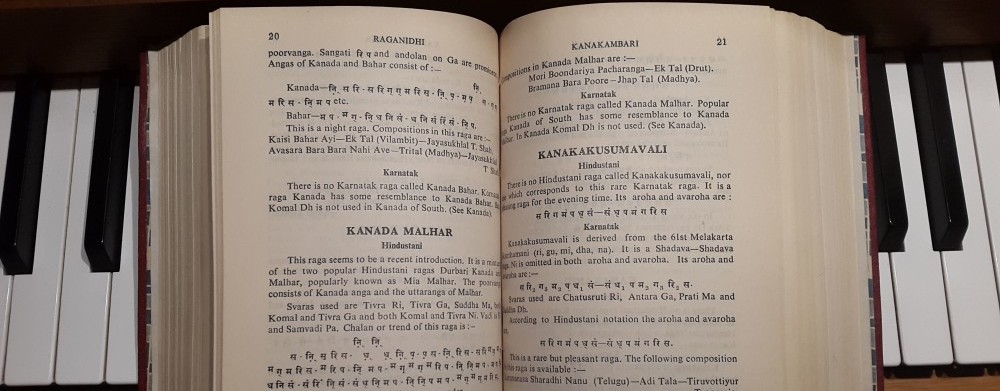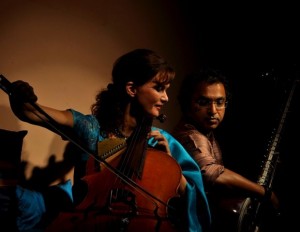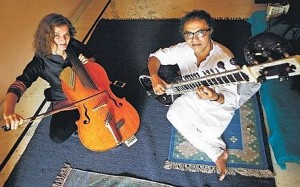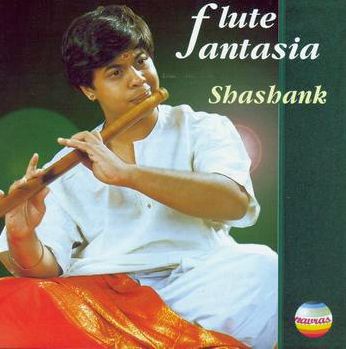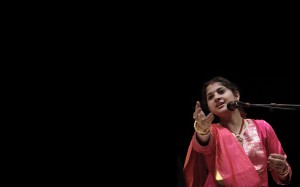Early September 2012 I heard (and met) Italian dhrupad singer Amelia Cuni in Göttingen, where she did a concert titled Cosmopolit@n Ragas. It was a beautiful musical event in two parts, starting out with Amelia Cuni’s performance of a raga in traditional dhrupad style. Then she took things in another direction by presenting her dhrupad-styled improvisational skills in a very different musical framework: she performed John Cage‘s Solo for Voice 58: 18 Microtonal Ragas. Here I like to share a beautiful recording of Amelia Cuni interpreting this work of John Cage. Enjoy!
Tag Archives: Indian classical music
Wonderful concept for an enhanced experience of raga music: The Silence Concert
To help people experience the power of Indian classical music, married and musical couple cellist Saskia Rao de Haas and sitarist Shubhendra Rao started the Silence Concert movement, to experience music in its purest form: surrounded by silence. An intriguing, fascinating concept.
Saskia and Shubhendra explained their initiative in The Hindu of 19 September 2012 and here’s what they have to say about it on the Silence Concert Facebook-page they created:
“What is a Silence Concert?
For the sensitive listener, there can be a big difference in attending a concert and experiencing music. The effect that music can have on our lives, especially Indian music, is often lost by the social conventions that prevail at concerts: applause, talking before and after the concert, ceremonies, all of which take the attention away from the music itself. To help people experience the magical power of Indian music in a concert setting, Pt Shubhendra Rao and Saskia Rao initiated the Silence Concerts movement. In a Silence Concert the only sound that reverberates is music. There are no introductions, ceremonies, gimmicks, talks, speeches or applause. The setting is serene, beautiful and set up to experience beauty within through the pure experience of music. Through controlling external influences that can distract listener and performer the experience of pure music is enhanced.
Entering the auditorium for a Silence concert, the audience and artists leave behind their worries and daily masks, because they do not have to respond in word or gesture to the outside world. They can be gently led through a sublime journey within. What follows is that their experience turns within. The artist can share his music without playing to the gallery and the effect lingers after the concert, not interrupted by applause.
Abhinavagupta (approx. 950-1020 AD), the Indian philosopher, said that the ‘perfect audience is a spotless mirror of the performer’. Audience and performer become one in a Silence concert. The social context is taken out and the audience is left with a truly introspective experience, as is the performer.” (Saskia Rao de Haas and Shubhendra Rao)
Saskia and Shubhendra end with a quote of Sufi Inayat Khan (1882-1927):
“While tuning the tanpura, the artist tunes his own soul. Not only has he tuned the instrument, but he has felt the need of every soul in the audience and the demands of their souls, what they want at that time. He becomes an instrument of the whole cosmic system, open to all inspiration at one with the audience, in tune with the tanpura and it is not only music, but spiritual phenomena that he gives to the people…‘ The object of Indian music is the training of the mind and the soul, for music is the best way of concentration. If one only knows how to appreciate it and give one’s mind to it, keeping all other things away, one naturally develops the power of concentration. Besides the beauty of music, there is the tenderness, which brings life [and gratitude] to the heart. For the person of fine feelings life in this world is very trying. It is jarring and it sometimes has a freezing effect. It makes the heart, so to speak, frozen. If one can focus one’s heart on music, it is just like warming up something that was frozen. The joy of life depends upon the perfect tuning of mind and body.”
Raga Unveiled – ambitious cinematic effort to grasp the essence of Hindustani classical music
I reported earlier on ‘Raga Unveiled’, an ambitious cinematic effort to take a look at the history and essence of the Hindustani classical music system. In this film – directed by Gita Desai and released in 2009 – scholars and great artists of today unveil the raga and demonstrate evrything you always would have liked to know about Indian classical music.
Here’s the trailer:
For anyone interested in raga music this 260 minute-film is a ‘must’ and of course it’s needless to say that you should see and buy the film on dvd in much better quality.
From the Hoboken Collection : Arnold Bake’s radiotalk (script) on Rabindranath Tagore
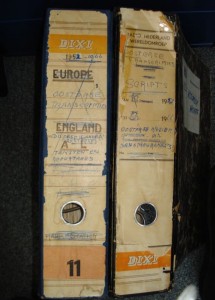
It’s certainly been too long – but better late, than never – since I announced to write on some of the interesting documents I found three years ago at Radio Netherlands from the legacy of Peter van Hoboken (1901-1994), Head of Transcription Service at Radio Netherlands from 1948 to 1966 and one of the great pioneers and promotors of Indian classical music in the Netherlands*. For several decades already there has been another and bigger Van Hoboken-collection that is incorporated in the Felix van Lamsweerde-collection, but most of the material that I came across at Radio Netherlands is different and therefore an interesting addition to the material that was known already.
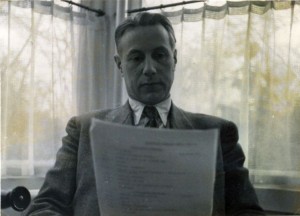
Peter van Hoboken in his office at Radio Netherlands
From here I’d like to refer to these documents as the Radio Netherlands Hoboken Collection, abbreviated as RNHC. My find in January 2002 of a unique recording by Radio Netherlands in 1957 of sitarist Ravi Shankar already illustrated the great value of Peter van Hoboken, who organised this recording. As an adept of Indian classical music and dance Van Hoboken organised recordings of concerts in The Netherlands and he produced many Radio Netherlands programmes on Indian classical music.
At this point I want to proceed with some interesting documents I found among the RNHC, concerning radiotalks done in 1950 by world famous dutch ethnomusicologist Arnold Bake (1899-1963), radiotalks Bake did in english and hindi about the musical life and culture of India, recorded for the Radio Netherlands Transcription Service to be distributed to presumably India and Surinam for broadcasts by stations over there. What I found of these radiotalks is only paperwork, Bake’s typed scripts along with his handwritten corrections. Unfortunately, the recorded tapes can’t be found in the Radio Netherlands Audio Archives, as these were sent to stations outside Holland, the main task of the Transcription Service.
It’s a great pity the recordings of Bake can’t be found in the archives of Radio Netherlands. I’ve asked Felix van Lamsweerde and they’re not in his Van Hoboken Collection. I would assume that they could have been stored in the Arnold Bake Archives, kept at the University of Leiden, but Felix and another expert, Fred Gales, told me that the collection over there contains only papers of radiotalks and not recordings. So, if not in Hilversum and not in Leiden, where can they be? Did the Radio Netherlands Transcription Service sent them to All India Radio and/or to Surinam or are they kept somewhere at the University of London’s School of Oriental & African Studies where Bake lectured? At this point I can’t believe they’re lost. I hope they can be found somewhere, as I’d like to hear how the scripts I found in Hilversum come alive in a radio transmission with Bake’s voice and with the music he talks about.
The radiotalk-script I like to present here contains Bake’s thougths on India’s world famous writer, poet, philosopher and Nobelprize winner Rabindranath Tagore (1861 – 1941), in particular on ‘Tagore and his music’ and when I publish this it’s 7 May 2011, precisely the 150th birthday of Tagore. So, yes, this update on the RNHC took me too long, but I think I’m right on time with presenting these particular papers. 🙂
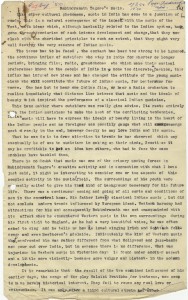
scriptpage 1, click a few times on the photo to enlarge
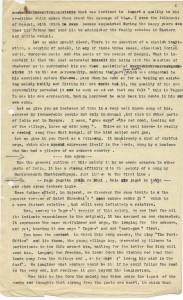
scriptpage 2, click a few times on the photo to enlarge
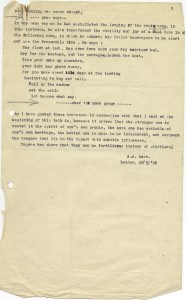
scriptpage 3, click a few times on the photo to enlarge
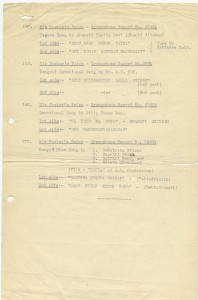
scriptpage 4, click a few times on the photo to enlarge
Let me add that I consider my short writings here on the RNHC as a work in progress. I don’t wanna pretend that I know all the details or have all the answers. That would be stupid and a false claim. If someone sees mistakes or things I overlook or has interesting additional information, please let me know.
* Radio Netherlands and Peter van Hoboken’s son Alexander have given me permission to publish these documents and write about them.
7 April 2011: Happy Birthday, Ravi Shankar !
Oceanic – Part 1, a beautiful, atmospheric track of Anoushka playing a sitar-duet with her father. Really touching. When I publish this message, it’s 7 April 2011, Ravi Shankar’s 91st birthday. Happy Birthday, Pandit ! 🙂
Shashank’s bansuri : music for a listener’s delight from his album ‘Flute Fantasia’
This album of Shashank – Flute Fantasia – has been a longtime favourite of mine. For instance the alap of raag Kafi is such a delight to listen to, especially around midnight. Follow this Spotify-link to play this track for free. The rest of this album is delightful as well and can of course be listened on Spotify as well. Highly recommended.
Kaushiki sings in Brussels, June 24th 2011
Kaushiki / Photo by Daniel Zafir (click on photo to enlarge)
Best news I’ve heard this week: Kaushiki Chakrabarty will sing on June 24th in Brussels :)) in the Palais des Beaux-Arts/Paleis voor de Schone Kunsten. Ahum… anyone in Holland picking this up?
Review: kleurrijk Darbar Festival fotoboek
Een review in Mixed No. 9, zomer 2009 over ‘Darbar Arts Culture Heritage’, een kleurrijk fotoboek over het jaarlijks in Engeland plaatsvindende Darbar Festival, het grootste ragamuziekfestival buiten India.
Klik enkele keren op de foto om de review te vergroten en te lezen.
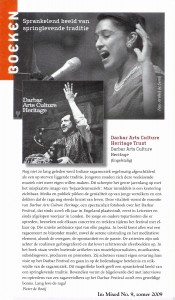
Uit het fotoboek een foto van zangeres Kaushiki Chakrabarty tijdens haar optreden op het Darbar Festival 2008.

Kaushiki Chakrabarty radio-special, 25 July 2009, with me as studio guest
Hey, that picture… looks like… is it…?… YES! …it’s Kaushiki-ji !!
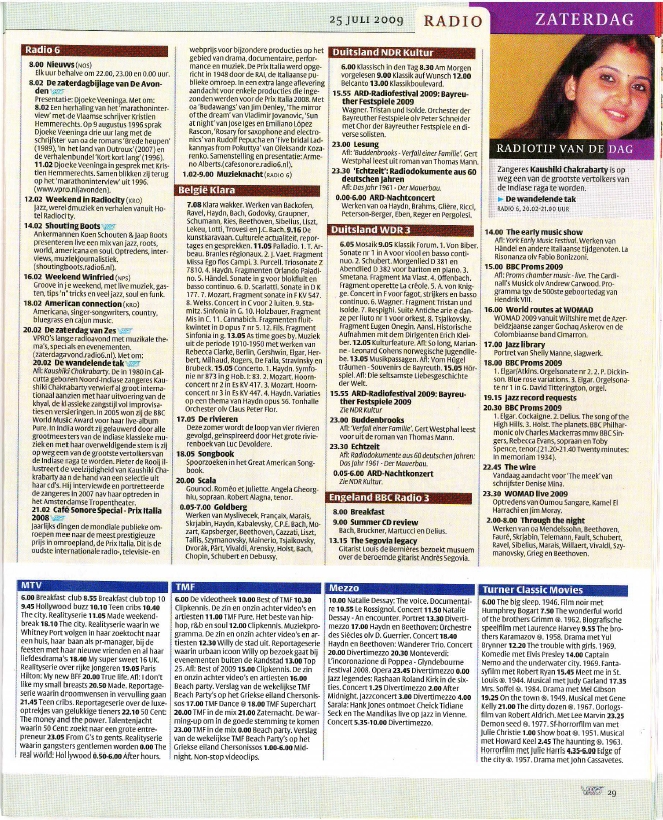
On Saturday 25 July 2009, dutch national channel Radio 6 featured a special on Kaushiki Chakrabarty in VPRO’s world music programme De Wandelende Tak. The programme’s host Walter Slosse interviewed me on Kaushiki’s career and music.
I also selected the music that was played in the programme, great music of course! The programme is still available for listening on demand.
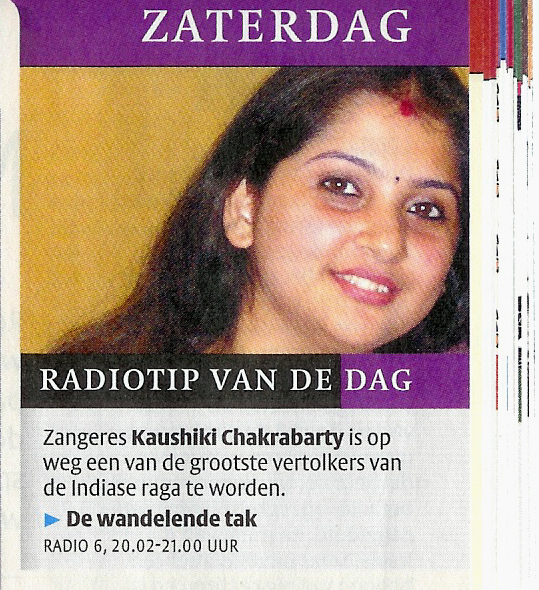
The programme was highligted as ‘radio programme of the day’ – with a photo (see above) of Kaushiki added and with additional info elsewhere on the same page (see below) – in the VPRO-guide (no.30, 25-31 July 2009), Holland’s best TV&Radio Guide.
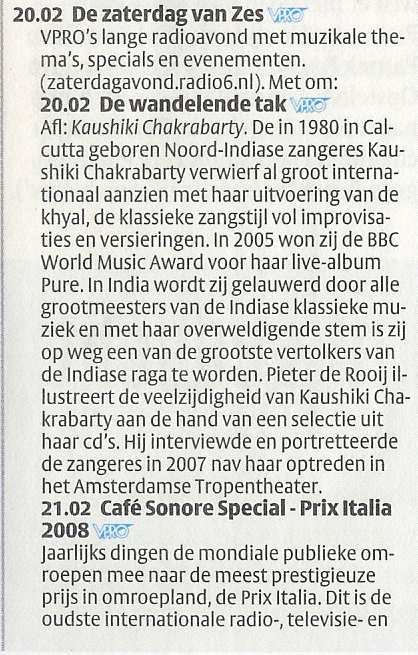
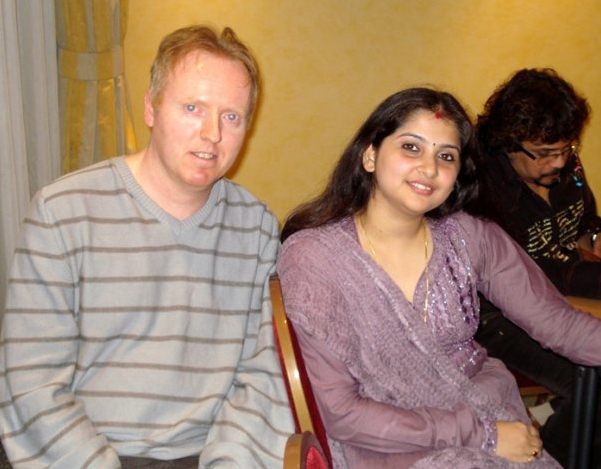
The picture shown in the VPRO guide is a cutout from this picture, showing me and Kaushiki in Leicester, during the Darbar Festival 2008.
Two years ago I portrayed Kaushiki in my radioprogramme Gharana and this episode is still ‘on demand’ available on the Concertzender website and I’ve also published a Youtube-portrayal of Kaushiki and some clips of her great Amsterdam concert in April 2007. Check it out, it’s great to hear and see her in performance!
You can still listen online to the special on Kaushiki.
Don’t miss Kaushiki at her best in this radio-special!
Ali Akbar Khan passed away, but his music lives on!
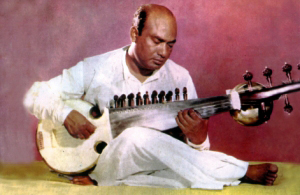
Sad news, a pillar of Indian Classical Music has fallen… Ali Akbar Khan passed away on Friday 19 June 2009. The one time I heard him live in the Mozes en Aäronkerk in Amsterdam in the eighties was an overwhelming experience, an unforgettable concert. Fortunately we can all access more than fifty years of good recordings of this no longer living legend.
There’s a lot of video footage of him too, for instance watch & listen him playing in a beautiful performance of Raag Brindabani Sarang, a clip that was published on 19 june(!) 2007.
Good comfort is that his music lives on forever!
